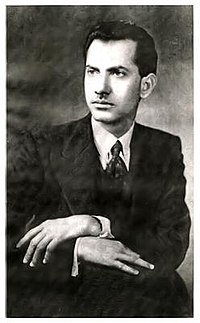Muhammad Ibrahim Khan Ghazi-e-Millat | |
|---|---|
سردار محمد ابراہیم خان | |
 Sardar Ibrahim Khan in his office in 1948 | |
| President of Azad Kashmir | |
| In office 25 August 1996 – 25 August 2001 | |
| Preceded by | Abdul Rashid Abbasi (interim) |
| Succeeded by | Sardar Anwar Khan |
| In office 5 June 1975 – 30 October 1978 | |
| Preceded by | Sardar Abdul Qayyum |
| Succeeded by | Muhammad Hayat Khan |
| In office 13 April 1957 – 30 April 1959 | |
| Preceded by | Sardar Abdul Qayyum |
| Succeeded by | Khurshid Hasan Khurshid |
| In office 24 October 1947 – 12 May 1950 | |
| Preceded by | Office established |
| Succeeded by | Ali Ahmed Shah |
| Personal details | |
| Born | 10 April 1915 Kot Mattay Khan, Poonch district, Jammu and Kashmir, British India |
| Died | 31 July 2003 (aged 88)[1] Islamabad, Pakistan |
| Resting place | Mausoleum of Sardar Ibrahim Khan, Kot Mattay Khan, Poonch District, Azad Kashmir, Pakistan |
| Political party | Muslim Conference Jammu Kashmir Peoples Party |
| Spouse | Zaib-un-Nisa Khan |
| Relations |
|
| Alma mater | Government Islamia College University of London Lincoln's Inn |
| Profession | Lawyer • Politician |
Sardar Muhammad Ibrahim Khan (Urdu: سردار محمد ابراہیم خان, pronounced [sər'da:r mo'ɦəməd ɪbra:'ɦi:m xa:n]; 22 April 1915 – 31 July 2003) was a revolutionary leader and politician from the western region of Jammu and Kashmir (present-day Azad Kashmir), who led the 1947 Poonch Rebellion against the Maharaja in the state of Jammu and Kashmir and played a key role in the First Kashmir War, supporting Pakistan. He served as the President of Azad Kashmir for 13 years across four non-consecutive terms and still remains the longest-serving president of the state, since its establishment.[2]
He is revered as Ghazi-e-Millat (Warrior of the Nation) in Azad Kashmir.[3]
- ^ Obituary and profile of Muhammad Ibrahim Khan Dawn (newspaper), Published 1 August 2003, Retrieved 25 January 2021
- ^ Snedden, Christopher (2013). Kashmir: The Unwritten History. India: Harper Collins Publishers. ISBN 978-9350298978.
- ^ Jahangir, Amar; Jamshad, Unsa; Khawaja, Anbrin (31 December 2021). "Political and Social Struggle of Ghazi-e-Millat Sardar Muhammad Ibrahim Khan". Journal of History and Social Sciences. 12 (2): 85–95. doi:10.46422/jhss.v12i2.179. ISSN 2221-6804.